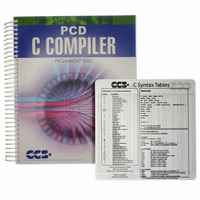PCDIDE COMPILER Custom Computer Services Inc (CCS), PCDIDE COMPILER Datasheet - Page 343

PCDIDE COMPILER
Manufacturer Part Number
PCDIDE COMPILER
Description
PCD C-COMPILER PIC24, DSPIC
Manufacturer
Custom Computer Services Inc (CCS)
Type
Compilerr
Datasheet
1.PCD_COMMAND_LINE_COMPILER.pdf
(373 pages)
Specifications of PCDIDE COMPILER
For Use With/related Products
Microchip PIC24/dsPIC®
Lead Free Status / RoHS Status
Not applicable / Not applicable
Other names
429-1008
- Current page: 343 of 373
- Download datasheet (4Mb)
The following are two methods provided:
1. Efficient access with "const".
2. Pointer friendly "ROM" Qualifier, for example:
How can I use two or more RS-232 ports on one PIC®?
The #USE RS232 (and I2C for that matter) is in effect for GETC, PUTC, PRINTF and KBHIT
functions encountered until another #USE RS232 is found.
The #USE RS232 is not an executable line. It works much like a #DEFINE.
The following is an example program to read from one RS-232 port (A) and echo the data to both
the first RS-232 port (A) and a second RS-232 port (B).
#USE
void
}
char
#USE RS232(BAUD=9600, XMIT=PIN_B2,RCV=PIN_B3)
void put_to_b( char b ) {
}
main() {
}
put(c);
putc(c);
char c;
put_to_a("Online\n\r");
put_to_b("Online\n\r");
while(TRUE) {
}
return(getc()); }
ROM BYTE TABLE[10] = {9,8,7,6,5,4,3,2,1,0}
and to access the table use:
//Be sure not to mix RAM and ROM pointers.
interchangeable.
c=get_from_a();
put_to_b(c);
put_to_a(c);
RS232(BAUD=9600, XMIT=PIN_B0, RCV=PIN_B1)
put_to_a( char c ) {
get_from_a( ) {
x = TABLE[i];
or
PTR = &TABLE[i];
and
x = *PTR;
They are not
329
Related parts for PCDIDE COMPILER
Image
Part Number
Description
Manufacturer
Datasheet
Request
R

Part Number:
Description:
PROTOTYPING BOARD FOR PIC MCU
Manufacturer:
Custom Computer Services Inc (CCS)

Part Number:
Description:
Extra CCS C Manual
Manufacturer:
Custom Computer Services Inc (CCS)

Part Number:
Description:
MACH X Programmer
Manufacturer:
Custom Computer Services Inc (CCS)

Part Number:
Description:
PCD For 24-bit (PIC24/dsPIC)
Manufacturer:
Custom Computer Services Inc (CCS)

Part Number:
Description:
LOAD-n-GO Programmer
Manufacturer:
Custom Computer Services Inc (CCS)

Part Number:
Description:
EMBEDDED INTERNET DEVELOPMENT KIT W/PCWH
Manufacturer:
Custom Computer Services Inc (CCS)

Part Number:
Description:
PIC24F Development Kit With PCWHD
Manufacturer:
Custom Computer Services Inc (CCS)

Part Number:
Description:
PIC24F Development Kit With PCDIDE
Manufacturer:
Custom Computer Services Inc (CCS)

Part Number:
Description:
PIC24H Development Kit With PCWHD
Manufacturer:
Custom Computer Services Inc (CCS)

Part Number:
Description:
USB Master Prototyping Board
Manufacturer:
Custom Computer Services Inc (CCS)










